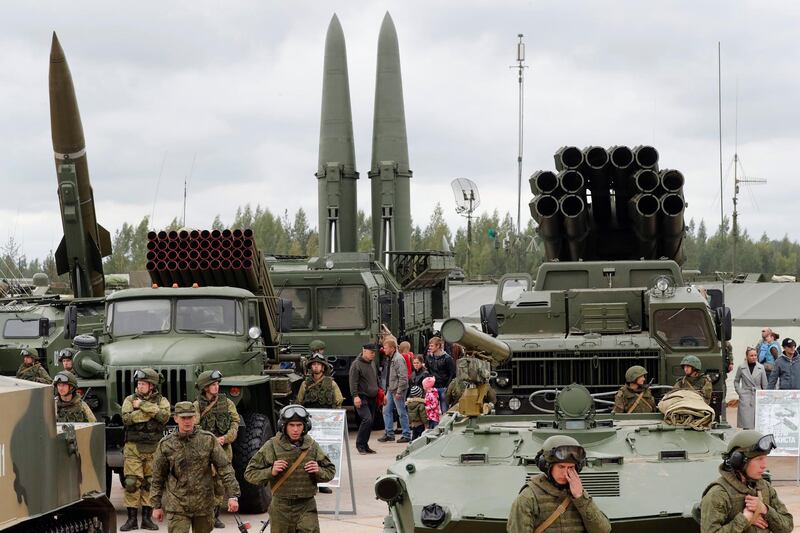The confirmation by Donald Trump that the US will leave a Cold War-era nuclear weapons treaty with Russia is “a major mistake” and another sign of intensifying geopolitical rivalry between the two powers that increases the risk of a new weapons race, arms control experts have said.
President Trump told reporters in Nevada on Saturday that the US would withdraw from the 1987 Intermediate-Range Nuclear Forces (INF) treaty. The agreement eliminated an entire class of ground-launched medium-range missiles with a range between 500 and 5,500 kilometres, which resulted in nearly 2,700 missiles being destroyed and helped ease a dangerous deadlock in Europe.
“Russia has violated the agreement. They’ve been violating it for many years and I don’t know why President Obama didn’t negotiate or pull out,” President Trump said. “We’re the ones that have stayed in the agreement and we’ve honoured the agreement but Russia has not unfortunately honoured the agreement so we’re going to terminate the agreement, we’re going to pull out.”
In July 2014, President Barack Obama accused Russia of breaching the treaty by extending the range of an existing short-range missile. Russia in turn accuses the US of breaching the treaty on several technical grounds. Both sides reject the allegations against them.
5. My biggest frustration is that the United States is now withdrawing from the INF treaty having not even tried (in a meaningful way) to bring Russia back into compliance. There is a sensible middle ground here between doing nothing and wrecking the treaty... (10/n)
— (((James Acton))) (@james_acton32) October 21, 2018
While some analysts accepted that Russia was in noncompliance with the INF, a US withdrawal made it look like the Americans are at fault. “My biggest frustration is that the United States is now withdrawing from the INF treaty having not even tried (in a meaningful way) to bring Russia back into compliance,” James Acton, co-director of the Carnegie Endowment’s Nuclear Policy Program, wrote on Twitter. “There is a sensible middle ground here between doing nothing and wrecking the treaty.”
The decision to pull out was a “major mistake” wrote Steven Pifer, an arms control expert and non-resident Brookings fellow. “US withdrawal from the INF Treaty is a loser all around. Russian officials probably are celebrating the news.”
_________
Read more:
Trump says US will pull out of intermediate range nuclear deal
Pentagon officials hope Mattis-Wei meeting will push US-China ties back in the right direction
Russia and Egypt grow closer as Kremlin asserts regional influence
_________
The decision to withdraw from the INF fits into a broader pattern of declining arms control measures. “It’s tempting to see that everything that Trump does as purely Trumpian but this has been an issue for some time,” said Dan Smith, the director of the Stockholm International Peace Research Institute. “The bigger picture is of bilateral arms control being in serious trouble. The architecture of arms control treaties is looking pretty wobbly.”
In the wake of the Ukraine crisis in 2015, Russia formally withdrew from the Treaty on Conventional Armed Forces in Europe, another pillar of the post-Cold War security system. That treaty had aimed to prevent surprise attacks and large-scale offensive operations between Nato and Russia by setting caps on deployable troop numbers and armaments.
Another significant nuclear arms reduction bilateral agreement, new START (Strategic Arms Reduction Treaty), is due to expire in 2021 with no talks scheduled on an extention.
“The risk of entering a new arms race is clearly visible,” Mr Smith said. “The big picture is an intensifying geopolitical rivalry between Russia and the US on the one hand and China and the US on the other.”
Deteriorating relations between the US and its rivals will likely lead to pressure to increase military spending and to develop new weapons. “None of the responses will happen very fast,” Mr Smith said, “but some years down the lines we could see new weapons” developed.
Despite President Trump's stated desire for better dealings with Russia, his announcement on the INF has alarmed Moscow. "Withdrawal from INF is completely at odds with @realDonaldTrump's stated desire to improve US-Russian relations," Alexandra Bell, a senior policy director for The Center for Arms Control & Non-Proliferation, wrote on Twitter.






